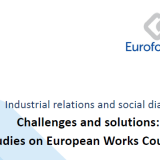EU context
Eurofoundi töö
Eurofoundi on 40 aasta jooksul arendatud töösuhete suundumuste jälgimise ja analüüsimise peamise eksperdikeskusena. Muu hulgas on jälgitud ja analüüsitud Euroopa ja riikide tasandi sotsiaaldialoogi vahelisi seoseid. Tuginedes 28 ELi liikmesriigis ja Norras asuvate Euroopa korrespondentide võrgustiku teadmistele, on kajastatud kõikides liikmesriikides ja ELis tervikuna toimunud arengusuundumusi.
Põhipanus
Eurofound on teinud EL 28s ja Norras valitsevate töösuhete kohta mitmesuguseid võrdlevaid analüüse, koostanud artikleid ja korraldanud juhtumiuuringuid ning korrapäraselt ajakohastanud asjaomaste teemade andmebaase.
Hiljutises uuringus antakse ülevaade 21. sajandi Euroopa töösuhete süsteemide asjakohastest põhimõõtmetest ja -näitajatest ning kirjeldatakse neid. Teiseks vaadeldakse, kuidas sotsiaalpartnerid on ELis ja Norras uurinud uusi teemasid, vahendeid ja innovatiivseid käsitlusviise, et lahendada viimastel aastatel tekkinud paljusid uusi poliitilisi, õiguslikke ja sotsiaalseid probleeme.
Tasustamine ja tööaeg on endiselt suurt huvi pakkuvad valdkonnad, mis igal aastal uuesti läbi vaadatakse. Üks tasustamisega seotud hiljutine uus uurimisteema keskendub seadusjärgse miinimumpalga tasemetele ELis, teine aga kollektiivsetele palgaläbirääkimistele.
Eurofound on 2006. aastast alates on Eurofound korraldanud Euroopa Komisjoni antud volituste alusel Euroopa valdkondlike sotsiaalpartnerite organisatsioonide representatiivsuse uuringuid.
Ressursid






































